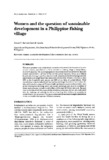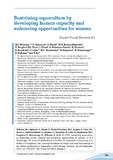Women and the question of sustainable development in a Philippine fishing village
Share
Abstract
This paper presents a case study of time use and contribution to the household income of men, women, and children in 12 households in a fishing village in Panay Island, central Philippines. The study highlights the differential impact of poverty on men and women and provides a glimpse of the intrahousehold dynamics within poor fishing households. Findings in previous studies in both industrialized and developing countries that women work longer hours than men were corroborated. Women contribute at least 22% to the household cash income and 40% of the value of unpaid labour. Their contribution to the household cash income becomes larger than that of men's when the value of livestock is computed. Women's daily participation in productive activities, such as fish vending and shucking oyster and mussel, unwittingly puts them in a position of being environmental recorders and verifiers of the state of fishery resources. Because they are burdened with the responsibility of making ends meet, they are also confronted with the challenge of realizing the dream of sending their children to university to enable them to escape poverty. This alone makes women one of the strongest stakeholders in the sustainable development of fishery resources.
Suggested Citation
Siar, S. V., & Cañeba, L. M. (1998). Women and the question of sustainable development in a Philippine fishing village. International Journal of Sustainable Development and World Ecology , 5(1), 51-58. https://doi.org/10.1080/13504509809469969
Subject
Collections
- AQD Journal Articles [1249]
Related items
Showing items related by title, author, creator and subject.
-
Esteeming the importance of comprehensive data for sustainable eel fisheries in Southeast Asia
Suryati, Ni Komang; Muthmainnah, Dina; Shimizu, Tomohito; Kamaluddin, Kasim; Supriyadi, Freddy; Pamungkas, Yanu Prasetio; Septimesi, Anissa; Septiana, Dwi Rizki (Secretariat, Southeast Asian Fisheries Development Center, 2024-07)In recent years, the value of tropical eels has significantly increased due to the decline of temperate eels. As a result, there has been a dramatic rise in the capture of glass eels and the juvenile stage of eels in ... -
Promoting strategies for sustainable management of swamp fisheries in the Southeast Asian Region
Supriyadi, Freddy; Muthmainnah, Dina; Rais, Aroef Hukmanan; Sawestri, Sevi; Anthoni, Rezki; Shimizu, Tomohito (Secretariat, Southeast Asian Fisheries Development Center, 2024-10)Recognizing the vital role of swamps in the Southeast Asian region, the Inland Fishery Resources Development and Management Department of SEAFDEC (SEAFDEC/IFRDMD) delved into various approaches to ensure the long-term ... -
Sustaining aquaculture by developing human capacity and enhancing opportunities for women
Williams, Meryl J.; Agbayani, Renato F.; Bhujel, R.; Bondad-Reantaso, Melba G.; Brugère, C.; Choo, Poh Sze; Dhont, J.; Galmiche-Tejeda, A.; Ghulam, K.; Kusakabe, K.; Little, D.; Nandeesha, M. C.; Sorgeloos, Patrick; Weeratunge, N.; Williams, S.; Xu, P. (FAO; NACA, 2012)People are at the heart of sustaining aquaculture. Development of human capacity and gender, therefore, is an important human dimension. Human capacity development (HCD) was a major thrust of the 2000 Bangkok Declaration ...




